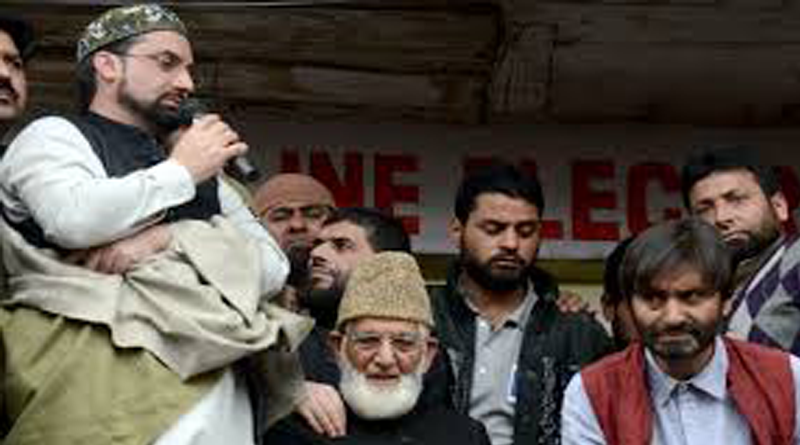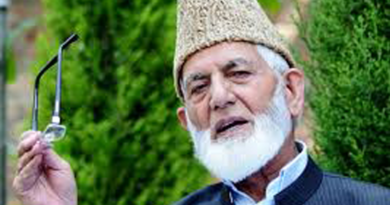3 requirements that can unite pro azadi camp
The talk of unity among the pro-freedom groups in Kashmir is as old as the current movement. Recently some Hurriyat leaders, among them Syed Ali Shah Geelani, the senior leader, have been talking about it. Here, I intend to make some submissions in this regard, but first let me allude to the bigger problem of which this is only a symptom. The bigger problem is the non-existence of a genuine as opposed to fake, manoeuvred, and engineered (by intelligence agencies) politics in Kashmir. This is an issue of far greater importance with huge implications for the future of Kashmir and the socio-cultural progress of its people.
It might be, however, worthwhile to state the crux of this bigger problem here before proceeding to the main subject. Genuine politics are one, which cohere with political realities on the ground. The basic political reality about Kashmir, universally acknowledged and undeniable, is that people of Kashmir though occupied and administered by India since 1947, have not integrated with it, and continue to nurture a sentiment variously known as ‘separatist sentiment’, ‘pro-Pakistan sentiment’, and, of late, sentiment of ‘azadi’. It is a mass sentiment but, unfortunately, and that is the most important thing to note, lacks a proper vehicle for productive expression. Pro-India politics aside (wrongly called mainstream politics), that is obviously fake and illegitimate because not only has it a clear disconnect with the mass sentiment but aims to kill it (on that count has an element of criminality in it); the freedom politics too, though genuine and real, in the sense that it connects with the mass sentiment, does not provide this sentiment the institutional refuge it deserves. Furthermore, genuine politics in Kashmir has to go beyond the political issue of Kashmir, not bypassing it but getting it resolved. For such politics the solution of Kashmir issue will be a means to an end, which is Kashmir and Kashmiri people, their better future and progress, and not the other way round. So much for the big problem, let us move forward now.
Now coming to the issue of unity in the freedom camp, let us first note that in a political environment like ours it is not a big thing to create a (UP) united platform, simply because there is a well defined common objective of solving the Kashmir issue, and in the face of a common enemy, always a popular pressure to unite. The real big job, however, is to sustain a UP and make it politically productive and meaningful. That is the real task, and needs a lot of effort. In this regard, I will list three requirements here, which need to be met for a united platform that delivers.
A shared sense of common purpose
This is the most essential requirement. The outfits in freedom politics, Hurriyat-affiliated and outside it, should have a strong sense of purpose. It has to be one single purpose common to all who unite. The uniting groups must share with each other the sense of purpose. I will elucidate the point by an example of a trading company, which though not wholly appropriate yet illustrates the point I am trying to make. Consider a company set up by some individuals. The purpose of company is growth and progress. This is the common purpose, the raison detre, the reason for the existence of the company, to which all stakeholders are committed. What drives the stakeholders to co-operate and work together is the sense of this common purpose. It is shared between the stakeholders, so much so, that being different individuals living in their own respective worlds, they act as one single entity in advancing the interests of the company, or the common purpose as we call it here.
Likewise, all the freedom loving groups aspiring to unite must understand that they are coming together to achieve a common goal. It is the purpose that has brought them together, and they should have a shared sense of this purpose. These groups may well have their individual ambitions, agendas, but the UP they create is solely for the achievement of common objective. The shared sense should be the driving force, and so overriding as to coalesce the different individual groups into a single ‘we’. UPs do not deliver if the sense of ‘we’ is lacking or is not overwhelming, in such cases the constituent elements use the platform to promote their individual interests.
A shared strategic vision
All those groups who want to come together must take a strategic view of the Kashmir issue and agree on a strategic course of action to seek its resolution. Two points have to be made in this regard:
First, for all such political/historical issues as that of Kashmir one has to always take a strategic view of the matter and operate in real time. True, the objectives that one sets out to achieve are not decided in a here-and-now framework, it is a long-term view of future as well as past that goes into their formulation, but when it comes to solution, and the way to achieve the objectives, there are no permanent ‘Halals’ or ‘Harams’, no laid-down text book prescriptions, one has to operate in real time, and demonstrate wisdom and prudence in real world situations, which, as a natural rule, keep changing. The variables, dynamics, parameters, all keep changing. Simply a one-off understanding does not suffice, the situation has to be constantly reviewed and understanding updated. The UP can behave differently in different situations, say for example, at one time you favour dialogue, at another you oppose it. Favouring and opposing, per se, is not important, what matters is clarity about the strategic direction, the direction that leads to objectives or to such gains which help you in reaching the objectives. As long as you make a headway in the strategic direction, you can say you have moved ahead. Please note, success does not mean a big leap from real to ideal on a fine morning, every single step in the right direction brings success closer. UP cannot afford a slightest confusion in its sense of strategic direction, a sharp sense of which coupled together with a firm will to act in right time can make a UP vibrant and operationally dynamic, otherwise it remains a dead corpus, immovable and static.
Second, true, the constituents of UP must have a consensus in order to work as a team, but what is the nature and extent of it?
As to its nature, the consensus has to be mainly political and strategic, not necessarily ideological. This is because, UP’s main burden to deliver is limited to the ongoing freedom movement, and does not extend to the overall politics of Kashmir which goes well beyond the solution of Kashmir issue. Politics, political systems and processes are meant to bring about a positive change and create a better tomorrow. The consensus needed for that has to be much deeper and wider, but that is not necessarily needed here. Here the extent of consensus can be much narrower, limited to the very basics of Kashmir issue, the broad strategic direction, and the course of action.
Structural and procedural requirements
In order to ensure smooth functioning, and avoid any conflicts or hiccups there must be a well defined set of procedures, structural arrangements, and institutional mechanisms to ensure fairness, accountability, transparency, and proper redress of grievances. In any human organization there is always a potential for conflict and dispute but these can be avoided by following the mutually agreed-upon rules and procedures. Also, in a forum like the UP where there are mature participants each having their own political identity and aspirations beyond UP as well, it is incumbent, particularly on the head of UP to ensure that everyone gets a due space and no one feels dwarfed or squeezed.
***
Dr. Syed M Inayatullah Andrabi is a well-known figure in the circles of political Islam. Born in Srinagar, the capital city of Indian Held Kashmir, Dr Andrabi has been intimately involved at the intellectual level with the global politics and political issues since his student days in 1980 at Pune (India), where he completed his Ph.D. in Linguistics in 1983 at the Centre of Advanced Study in Linguistics, Deccan College, University of Pune, Pune, India. Upon completing his doctorate he returned home to join the University of Kashmir, first on a post-doctoral fellowship and later as faculty, but could not continue because of the deteriorating security situation in Kashmir, and had to move to United Kingdom in 1994 where he continues to live since along with his wife and five children.




